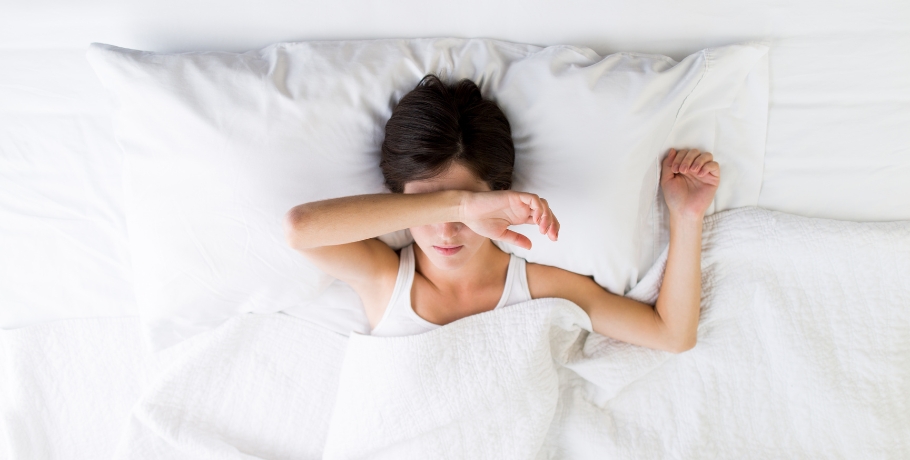
Having trouble sleeping is an issue that many people face. Common causes can include stress, anxiety, poor sleep habits, and environmental disturbances such as blue light. Solutions include establishing a consistent sleep routine, optimizing the sleep environment, blocking blue light, consuming the right nutrients, and incorporating relaxation techniques such as breathing exercises and meditation. By understanding and managing these factors, you can improve your sleep quality and restore your health.
12 Tips for Better Sleep
- Create a sleep routine: Go to bed and wake up at the same time every day, even on weekends. This helps the body establish a natural sleep rhythm.
- Optimize your sleep environment: Ensure your bedroom is completely dark, cool, and quiet. Keep the room temperature around 18°C, as a cooler environment promotes deeper sleep. Use blackout curtains and earplugs if needed.
- Avoid screen time and blue light before bed: Blue light from phones, tablets, and computers can disrupt melatonin production. Turn off screens at least an hour before bedtime and always use Blue Blockers glasses to block blue light. Learn more about how blue light affects sleep.
- Breathing exercises and meditation: Try techniques like the 4-7-8 method, where you inhale for 4 seconds, hold your breath for 7 seconds, and exhale for 8 seconds to calm the body. Regular meditation can help reduce stress and anxiety, promoting better sleep.
- Visualization techniques: Imagine a calm and peaceful place, which can help you fall asleep faster.
- Sound therapy and soothing music: Calming sounds, like rain, ocean waves, or relaxing music, can help block out disruptive noises and create a tranquil environment.
- Sleep-promoting foods and drinks: Foods rich in magnesium and tryptophan are beneficial for good sleep. Red meat and poultry are excellent options. Consume most of your carbohydrates at dinner but avoid eating too close to bedtime.
- Supplements: Supplements such as magnesium, melatonin, and valerian root can support relaxation and improve sleep quality.
- Physical activity and sleep: Regular exercise, especially in the morning or afternoon, can promote better sleep at night.
- Morning walks: Take a daily morning walk to reset your body’s circadian rhythm and improve nighttime sleep.
- Avoid deficiencies in the following nutrients: Blue light can disrupt melatonin production. Always use Blue Blockers glasses and include the following in your diet:
- Tryptophan: An essential amino acid that is a precursor to melatonin production. Rich sources include turkey, chicken, eggs, milk, cheese, nuts, seeds, and fish.
- Vitamin B6 (Pyridoxine): Involved in converting tryptophan to serotonin and then to melatonin. Good sources include chicken, fish, and bananas.
- Magnesium: Important for supporting relaxation and converting tryptophan to melatonin. Sources include shellfish, fish, beef, poultry, and dairy products.
- Vitamin B5 (Pantothenic Acid): Supports serotonin production and is therefore essential for melatonin. Sources include meat, eggs, and avocados.
- Zinc: Helps in the conversion process from serotonin to melatonin. Found in foods like meat and shellfish.
- Folic Acid (Vitamin B9): Assists in serotonin metabolism and is indirectly crucial for melatonin production. Sources include liver, dairy products, and egg yolks.
- Calcium: Helps the brain convert tryptophan into melatonin. Found in dairy products and sardines.
- Niacin (Vitamin B3): Plays a role in converting tryptophan to serotonin and contributes to melatonin production. Sources include liver, chicken, turkey, and fish.
Common Causes of Sleep Problems
- Stress and anxiety: Excessive worry can make it difficult to relax and fall asleep.
- Poor sleep habits: Irregular sleep schedules and stimulation before bedtime can disrupt the body’s circadian rhythm.
- Environmental factors: Noise, light, and temperature can negatively affect sleep quality.
- Lifestyle factors: Lack of physical activity, poor diet, late-night eating, and high caffeine or alcohol consumption can disrupt sleep.
How Sleep Problems Affect Health
- Physical health: Chronic sleep deprivation can increase the risk of illness and obesity.
- Mental and emotional health: Sleep problems can lead to increased anxiety, depression, and irritability.
- Immune system and recovery: Sleep helps repair cells and strengthen the immune system. Sleep deprivation can weaken immunity.
- Performance and concentration: Lack of sleep impairs cognitive functions such as memory, concentration, and problem-solving.
- Long-term consequences: Prolonged sleep deprivation can contribute to chronic health conditions and weakened immunity.
How to Improve Sleep by Changing Habits
- Routines and habits: Establish regular sleep routines and avoid activities that stimulate the brain before bedtime.
- Balance work and leisure: Avoid bringing work into the bedroom and make time for relaxation.
- Stress management: Use techniques like meditation and breathing exercises to manage stress.
- Regular physical activity: Exercise can help release tension and improve sleep quality.
- Nutrition: Eat a balanced diet that includes nutrients promoting sleep, such as magnesium and tryptophan.
- Avoid alcohol and caffeine: Both can disrupt sleep, so avoid them, especially in the evening.
How Many Hours Should You Sleep?
The recommended amount of sleep for an adult is between 7–9 hours per night. We discuss what affects how much sleep you need in a separate guide. If you want to know whether you can sleep too much, read more here. Understanding your sleep stages is also an important factor we cover in detail.
